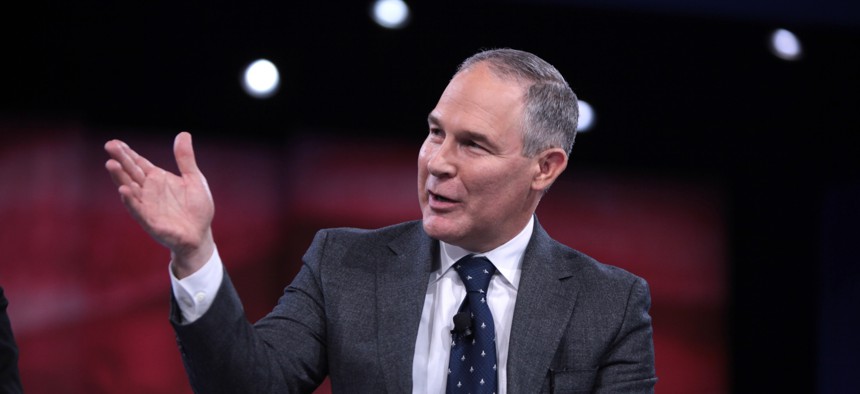
Environmental Protection Agency nominee Scott Pruitt is among the progressive's main targets. Flickr user Gage Skidmore
Liberals Narrow Their List of Trump Picks to Target
Rather than complain about every Trump cabinet choice, the Senate’s most prominent progressives have put a special focus on a handful of nominees.
Faced with a long list of adversarial Cabinet nominees, the Senate’s leading voices on the Left have decided to narrow their target list.
Rather than complain about everyone that President-elect Trump has picked, liberals on the Hill say they’re focusing their attention on candidates who seek to undermine the agencies they could soon represent.
Topping their concerns in the confirmation hearings, they say, are Environmental Protection Agency nominee Scott Pruitt, Attorney General nominee Jeff Sessions, and secretary of State nominee Rex Tillerson. In the coming weeks, that list will expand to include Health and Human Services nominee Rep. Tom Price and Labor nominee Andy Puzder.
While all of Trump’s nominees are expected to be confirmed, liberals’ strategy on their confirmation hearings could offer some insight on the Left’s approach to a Trump White House over the next four years. And in some cases, early fights on the Hill will signal a shift in priorities, as leaders pick their battles between multiple hearings going on at once.
“We’ve got several fights on our hands, and we have to be able to walk and chew gum at the same time,” Sen. Brian Schatz of Hawaii said in an interview with National Journal. Schatz said Pruitt’s plans to “do violence” to EPA put the Oklahoma attorney general at the top of his personal concern list, but added that there’s a “pattern” among “the most objectionable nominees.”
“The secretary nominee for Human Services seems to want to shred the social safety net,” said Schatz. “The EPA nominee seems to want to undermine the Clean Air and Clean Water Acts, and the secretary of Labor seems to not want to represent labor, but rather management.”
In an interview outside of Sessions’s confirmation hearing, Sen. Chris Van Hollen of Maryland echoed that sentiment, listing Sessions and Pruitt as areas of focus. Sen. Bernie Sanders spokesman Michael Briggs said Sanders was also focusing his attention on Sessions and Puzder.
“People have concerns about a lot of them, so it’s difficult to narrow it down at this point,” said Van Hollen. But “in each case we want people leading agencies who support the mission of the agencies.”
For the time being, liberals say those confirmations take priority, even over choices like Treasury secretary nominee Steven Mnuchin, a former Goldman Sachs executive. Mnuchin’s plans to “strip back” key elements of Dodd-Frank would directly undermine Sen. Elizabeth Warren’s work on consumer protection—an issue that’s served as a main rallying point for the base in recent years.
Warren’s office did not respond to requests for comment, but the senator has written letters condemning many of Trump’s picks, including Education nominee Betsy DeVos and Housing and Urban Development nominee Ben Carson. Warren spoke vehemently against Mnuchin when he was nominated, calling him the “Forrest Gump of the financial crisis.”
“It’s kind of the Maslow’s hierarchy of needs,” Democracy for America spokesman Neil Sroka said, referring to a well-known psychology theory about what motivates people. He said that while Mnuchin’s Wall Street ties were “deeply concerning,” polling and interviews of DFA members since November’s election indicated they were more concerned about civil rights, environmental issues, and even foreign policy—an issue that rarely registered at all for them under the Obama administration.
For that reason, some liberals caution reading too much into the confirmation hearings. Angela Kelley, executive director for the Center for American Progress Action Fund, said once actual policy battles begin to take shape, the base’s priorities will start to match those of leaders on the Hill.
“[Warren] is really the leader of a significant base now … so I think that she’s going to be in a position to really dictate the agenda, people will largely follow,” said Kelley. “The challenge right now is, with the exception of the [Affordable Care Act] battles, we’re talking about people, and not yet policy.”
So as Republicans work to push many of the nominees through before Trump’s inauguration, some are trying to keep the focus on a broader theme they believe will help them down the line electorally.
“You have a larger pattern here, which is that you have a person who runs for president claiming that he was the champion of working people and yet so many of his nominees are people who did very well for themselves, often at the expense of people who were working for them, or at the expense of others,” said Van Hollen.
Adam Green, president of the Warren-aligned Progressive Change Campaign Committee said that’s the sort of message that Democrats can use not only to rally the grassroots, but also appeal to some of Trump’s own supporters.
“It’s important for Democrats to have a unified message so that voters actually hear our message regardless of the issue of the day or hour,” said Green. “And across these nominations there is a theme of corporate cronyism.”
While Republicans have the votes to approve all of the nominees on their own, Democrats can draw out the process by opening discussion on the Senate floor. Some grassroots groups, such as MoveOn, are pushing their allies on the Hill to use that and other tools to buy more time for them to parse the target-rich pool of nominees.
Schatz said Democrats were still considering calling for additional hearings and whether or not to expedite nominations on the floor.
“We’re certainly prepared to collaborate when it’s in the public’s interest, but the process has to ensue,” he said.
(Image via Flickr user Gage Skidmore)






